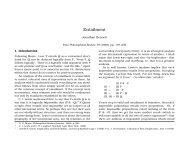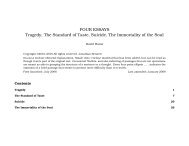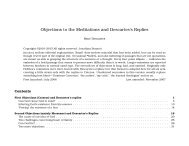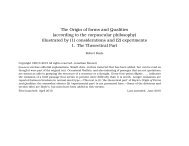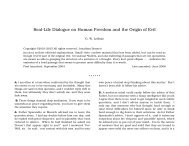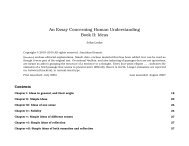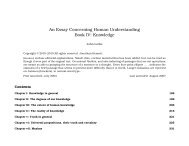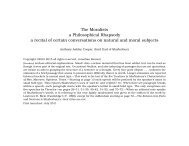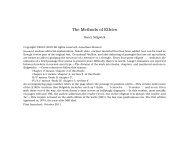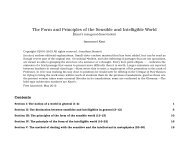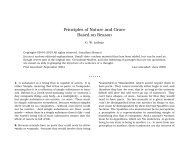A Vindication of the Rights of Woman with - Early Modern Texts
A Vindication of the Rights of Woman with - Early Modern Texts
A Vindication of the Rights of Woman with - Early Modern Texts
You also want an ePaper? Increase the reach of your titles
YUMPU automatically turns print PDFs into web optimized ePapers that Google loves.
The <strong>Rights</strong> <strong>of</strong> <strong>Woman</strong> Mary Wollstonecraft 5: Pity bordering on contempt<br />
Chapter 5:<br />
Writers who have rendered women objects <strong>of</strong> pity, bordering on contempt<br />
We now have to examine <strong>the</strong> opinions on <strong>the</strong> female character<br />
and education that have been plausibly argued for in some<br />
modern publications, and have given <strong>the</strong> tone to most <strong>of</strong><br />
<strong>the</strong> briefer and more casual things said about <strong>the</strong> sex [see<br />
Glossary].<br />
1: Rousseau<br />
I shall begin <strong>with</strong> Rousseau, giving a sketch <strong>of</strong> <strong>the</strong> character<br />
<strong>of</strong> women in his own words and interspersing comments and<br />
reflections. My comments will all spring from a few simple<br />
principles, and could be derived from what I have already<br />
said; but his argument has been constructed <strong>with</strong> so much<br />
ingenuity that I think I have to attack it in a more detailed<br />
manner, and make <strong>the</strong> application ·<strong>of</strong> my principles· myself<br />
·ra<strong>the</strong>r than leaving it to <strong>the</strong> reader·.<br />
Sophie, says Rousseau, should be as perfect a woman as<br />
Émile is a man, and to make her so he has to examine <strong>the</strong><br />
character that nature has given to <strong>the</strong> ·female· sex.<br />
He <strong>the</strong>n proceeds to argue that woman ought to be weak<br />
and passive because she has less bodily strength than man;<br />
from which he infers that she was formed to please him and<br />
be subject to him, and that making herself agreeable to her<br />
master is <strong>the</strong> grand purpose <strong>of</strong> her existence. Still, to give a<br />
little mock dignity to lust he insists that when a man goes<br />
to a woman for pleasure he should not use his strength and<br />
should depend on her will.<br />
[In quotations from Rousseau’s Émile, three centered asterisks mean that<br />
<strong>the</strong> next quotation comes from a few pages later than <strong>the</strong> preceding one.]<br />
8 What nonsense! [That is MW interrupting; and it was she who put that last clause in italics.]<br />
53<br />
·ROUSSEAU·<br />
So we deduce a third conclusion from <strong>the</strong> different constitutions<br />
<strong>of</strong> <strong>the</strong> sexes, namely: The stronger should be master<br />
•in appearance but should depend on <strong>the</strong> weaker •in fact. . . .<br />
This is because <strong>of</strong> an invariable law <strong>of</strong> •nature, which goes<br />
like this:<br />
Nature gives woman a greater ability to arouse desires<br />
·in man· than it has given man to satisfy <strong>the</strong>m; so<br />
it—·nature·—makes <strong>the</strong> man dependent on <strong>the</strong> good<br />
pleasure <strong>of</strong> <strong>the</strong> woman, and forces him to try to please<br />
her in his turn, in order to obtain her consent that he<br />
should be stronger. 8<br />
On <strong>the</strong>se occasions, <strong>the</strong> most delightful circumstance that<br />
a man finds in his victory is to be unsure whe<strong>the</strong>r she has<br />
yielded to his superior strength or whe<strong>the</strong>r her inclinations<br />
spoke in his favour. The females are usually artful enough to<br />
leave this in doubt. Women’s understanding in this matter<br />
corresponds exactly to <strong>the</strong>ir constitution: far from being<br />
ashamed <strong>of</strong> <strong>the</strong>ir weakness, <strong>the</strong>y glory in it; <strong>the</strong>ir tender<br />
muscles make no resistance; <strong>the</strong>y pretend to be unable to lift<br />
<strong>the</strong> smallest burdens, and would blush to be thought robust<br />
and strong. What is <strong>the</strong> purpose <strong>of</strong> all this? Not merely for<br />
<strong>the</strong> sake <strong>of</strong> appearing delicate, but. . . .also to prepare <strong>the</strong><br />
way for being feeble whenever that suits <strong>the</strong>ir purposes.<br />
·WOLLSTONECRAFT·<br />
. . . .If Rousseau is right about woman’s duty—if pleasing man<br />
is <strong>the</strong> iron bed <strong>of</strong> fate that her character should be made to fit,<br />
stretching or contracting it regardless <strong>of</strong> moral and physical



